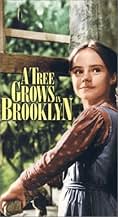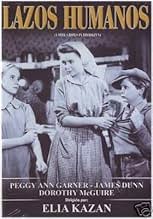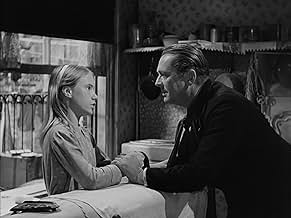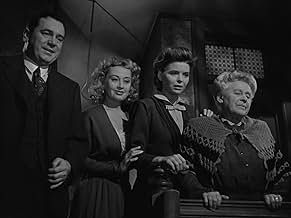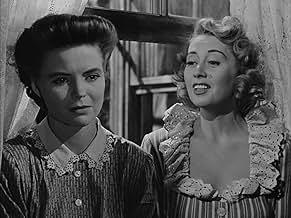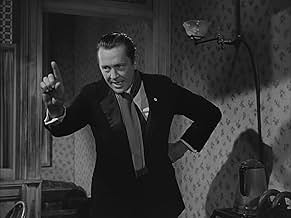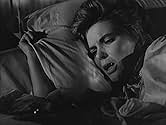Ajouter une intrigue dans votre langueEncouraged by her idealistic if luckless father, a bright and imaginative young woman comes of age in a Brooklyn tenement during the early 1900s.Encouraged by her idealistic if luckless father, a bright and imaginative young woman comes of age in a Brooklyn tenement during the early 1900s.Encouraged by her idealistic if luckless father, a bright and imaginative young woman comes of age in a Brooklyn tenement during the early 1900s.
- A remporté 1 oscar
- 9 victoires et 1 nomination au total
- Augie
- (uncredited)
- Nurse
- (uncredited)
- Mr. Creckenbox
- (uncredited)
- Girl
- (uncredited)
- Old man on second floor landing
- (uncredited)
- Grandma Rommely
- (uncredited)
- Cheap Charlie
- (uncredited)
- Miss Tilford
- (uncredited)
Avis en vedette
So it's a bit of a surprise that Fox would market a film like A Tree Grows in Brooklyn. The nostalgia is there, but there's a large slice of reality in this film about life growing up in the Williamsburg section of Brooklyn pre World War I. Maybe because a new director, named Elia Kazan who would make his mark directing dramas of social significance was in charge here.
It was his feature film debut as a director, so Darryl Zanuck didn't give Kazan a name cast to work with. Some were up and coming, some were coming back, and some were fading out. Yet the mix was great, not a bad note in the cast.
I also have to say that I liked Kazan's use of the hurdy-gurdy as background music. Rings on Her Fingers and Ciri-biri-bin were never played better.
This was Dorothy McGuire's third feature film and the role of Katie Nolan was hardly a glamorous one. But she's perfect as the mother who keeps her family together, but loses and regains some humanity in the process. She was an underrated actress in her time, always gave great performances and was never fodder for the scandal sheets.
Joan Blondell and James Dunn were respectively cast as McGuire's sister and husband. Blondell, who had sparkled in Warner Brothers musical films and films of social significance was a perfect fit for Aunt Cissy. With this role she transitioned nicely into character roles and never lacked for work.
The career of James Dunn is a puzzle. He was an ex-vaudevillian of good talent who had slipped into B Films by the time A Tree Grows In Brooklyn was made. He won a richly deserved Oscar as Johnny Nolan, singing waiter and would be star. Maybe his dreams outraced his talent, but Nolan had every reason to dream. What's not remembered is that folks who would have been Dunn's contemporaries like Eddie Cantor and Jimmy Durante started out that way. He was a man with the talent, but you need the breaks as well.
Dunn's scenes and relationship with daughter Peggy Ann Garner pivot the film. His character of Johnny Nolan is not unlike Gaylord Ravenal in Showboat if he had stayed around until his daughter was beginning adolescence. That Oscar should have revived Dunn's career, but didn't. He had very much the alcohol problem that his character in the film had. Ironically he's remembered today for supporting Shirley Temple in three of her films in the thirties than this Oscar winning, best supporting actor performance. But maybe those films were good training for this role. Neither Dunn nor Garner upstage the other.
The best acted scene in the film is when McGuire goes into labor and Garner is the only one around. Back in those days before medical insurance, people had their babies at home and infants died, due to lack of good post-natal care. In fact prior to this scene, Joan Blondell cashes in an insurance policy so she can splurge on the cost of a hospital because previous infants of her's had died.
Garner is a bright girl and her father encouraged her to dream big as he did. She was daddy's little girl and her relationship with mom was not all it should have been. As mom goes into labor and they wait for Blondell to arrive, they start confessing to each other. Garner realizes the sacrifices mom has made and McGuire realizes how much she's stifled her daughter's dreams. It's a wonderfully played scene and you're made of stone if it doesn't affect you.
Rounding out the cast is Lloyd Nolan as the neighborhood beat cop, James Gleason as a tavern owner and Ted Donaldson as Garner's younger brother. I should also mention that Peggy Ann Garner got an honorary Oscar as most promising juvenile performer of 1945. She had a decent career, but nothing ever as good as A Tree Grows In Brooklyn.
Opening with an eye-view of early Brooklyn with horses pulling the food carts through cobblestone streets, trolleys passing by ringing the bell, clothes hanging out to dry over the back alley of apartment buildings on the line connected from one fire escape to another, the first half hour gives an insight look into the livelihood of the Nolan family: Katie Nolan (Dorothy McGuire), an embittered wife and mother who must scrub floors in order to support her family; Johnny (James Dunn), her happy-go-lucky husband who just can't seem to find time to earn a living but does take the time to cater to his children, particularly his "prima dona" adolescent daughter, Francie (Peggy Ann Garner); Francie finds the world a fabulous place to grow up in, and like President Abraham Lincoln, wants to learn everything about anything by reading books; Neely (Ted Donaldson), the youngest, would just rather enjoy himself playing in the streets with the other kids than going to school. While Francie and Neely are total opposites, they are typical brother and sister, having their differences but showing their devotion for one another. Their dad, Johnny, a singing waiter by profession, is a caring soul with a weakness for drinking and gambling. His wife, who feels him a failure, would discover, at his funeral the abundance of people in attendance, that anyone with as many friends as he had was not a total failure at all. Since Johnny was taken for granted by both his wife and son, Francie is one who looked up to him as someone special. Another member of their family looked upon with great fondness by the children is their beloved and fun- loving Aunt Sissy (Joan Blondell), whose past reputation doesn't go well with sister, Katie.
At 128 minutes, there's bound to be slow spots, but with those slow spots comes some great highlights: The Nolan kids visits to the local meat market telling the butcher their order for what "Momma said"; Francie reading a book on the fire escape and observing everything going on around her; Johnny singing a traditional Irish song, "Annie Laurie"; The Nolan kids obtaining a Christmas tree from a street vendor (B.S. Pully) on Christmas Eve followed by the family togetherness on Christmas Day; Aunt Sissy taking Francie to a secluded place in the school building after the girl receives her graduation gift (flowers), arranged several months ago by her father, now deceased, so she can have herself a good cry; and Officer McShane (Lloyd Nolan - excellent) nervously proposing to Widow Katie Nolan so he can provide for her and her new born baby; and one on the rooftop with Francie and Neely overseeing the city of Brooklyn, looking back with fondness to the times they had together, putting those memories behind them.
With Peggy Ann Garner being the main focus here, she deservedly won a special Academy Award for her natural performance. James Dunn (1904-1967), a veteran actor of Fox Films best known for his roles opposite Shirley Temple in the mid 1930s, makes a temporary comeback in a major motion picture that earned him a much deserved Academy Award as Best Supporting Actor of 1945. Along with Garner, Dunn was not only a natural, but born to play his role, that of Johnny Nolan. Let's not overlook Joan Blondell, another screen veteran, giving one of her best performances of her career that should have been honored an Academy Award nomination as Best Supporting Actress. Along with Dunn, Blondell's chemistry with the children is not only natural, but highly memorable.
In smaller but not entirely unimportant roles are Lloyd Nolan (Officer McShane); James Gleason (Mr. McGarrity, the neighborhood barber); John Alexander (Steve Edwards, Sissy's latest husband); Ruth Nelson (Mrs. McDonough, Francie's teacher who inspires her to become a write); and J. Farrell MacDonald (Carney, the junk man). That distinctive voice of the Christmas tree vendor belongs to B.S. Pully. And who can forget boy actor Ted Donaldson's distinctive Brooklyn accent, adding the flavor to character.
A TREE GROWS IN BROOKLYN might have been filmed at the back-lot of 20th Century- Fox, but it does have that Brooklyn flavor to it (particularly with the organ grinding score to "Rings on Her Fingers" and other popular tunes of the day. Author Betty Smith recaptures everything there is to the old New York and the characters she created, while Elia Kazan, making his directorial debut, successfully brings all this and the characters to life.
A TREE GROWS IN BROOKLYN (in reference to a tree in the back lot of the apartment) was distributed on video cassette in 1991. Other than becoming a late show favorite on commercial television from the 1960s to the 1980s, especially on Christmas Eve, it has later enjoyed frequent revivals on American Movie Classics cable channel for many years before turning up on the Fox Movie Channel and Turner Classic Movies where it premiered February 8, 2009. In spite of a 1974 television movie remake, the 1945 original remains an unsurpassed movie gem. Why? Because, "Momma said." (****)
It is like the anti-"Meet Me In St. Louis" of the previous year. This American family is one of second generation Americans, descended from European immigrants, who have no particular skills and live in the tenements of Brooklyn. The central character is the daughter, Francie, who is a bit of a dreamer like her father, and in fact she adores her father. She wants to be a writer and has a great thirst for knowledge. There is a very cute exchange between herself and the local librarian when she says she is trying to read her way through the library alphabetically by author but has reached a book that is probably just too much for an eleven year old girl. The brother - hard to tell if he is a year older or younger - is very different from her, not that interested in learning, and would probably not go to school if he was not forced, but that doesn't mean he is a bad kid.
You meet the mother in the family first -Katie Nolan (Dorothy McGuire). This first scene is skillfully written, and you immediately get, before even meeting him, that Katie is always doing battle with the family budget and must scrub floors for a living because her husband is a bad provider. In short she is tired of his nonsense but feels trapped.
Then you meet the father and husband - Johnny (James Dunn). He is a singing waiter when he can find work. He has a good voice, but he has neither gotten serious about singing as a career or outright abandoned it in favor of learning some other trade. Instead he is always dreaming about his ship coming in. He is an alcoholic but not a mean one. And he is exactly the kind of guy who would sweep a girl off her feet when she is 18, but who will never pan out as far as getting serious about work and whom you will be acutely impatient with by age 30. James Dunn won an Oscar for his performance here, and ironically he actually was fired by Fox in the 1930s because of his drinking and Fox was reluctant to take him on again for this role because they did not want a repeat performance.
Katie's sister, Sissy, is played by the boisterous Joan Blondell. Sissy seems to have money - she is always well dressed. And she has just entered into a third marriage without really being sure she was divorced from the second. She has money but no children, which she wants badly. However, she has had several miscarriages. Katie has children but not enough money to really support them. So you feel like some of the undercurrents of tension between the two sisters is that each badly wants something that the other one has and feels that they take it for granted.
One of the great things about this film is that it takes time to go about the neighborhood and let you meet all of the people who live there - the barber, the local saloonkeeper (James Gleason), the sick little girl who lives downstairs, and the local beat cop. Together this weaves an interesting tapestry of atmosphere.
So this is "one year in the life of an American family", but that year is full of hard knocks and also some complete tragedies, but some good events too. It is absolutely worth watching.
`A Tree Grows in Brooklyn,' from Betty Smith's poignant novel, is able to capture the essence of the author's words not only because of its trenchant
writing, but because of three remarkable, beautifully-realized performances. Peggy Ann Garner offers one of the most astonishing child performances ever, finding the very spirit of this 12-year-old child going on 21. Blessed with one of the most expressive faces witnessed on camera, her eyes are sheer poetry and alone speak volumes as Francie, a young girl devoted to her ailing, debilitating father and brutally distant from an unnurturing mother she partially blames. It is such a complete performance. Her steadfast growth in this film is beautiful to observe as she begins to spread her branches and assume her rightful place in life sooner than expected. Garner is simply unforgettable.
James Dunn, as Jimmy Nolan, leaves an indelible impression as the amiably charming ne'er-do-well, a solitary dreamer who has frittered his life away, as well as his family's money. Despite the cruelties of his actions, your heart aches for this man. His touching scenes with daughter Francie reveal his innate goodness and its heart-wrenching to watch him dissolve before your very eyes. Even a treasured bond with his idolizing daughter isn't enough for him to fight hard enough to forego the liquor bottle and regain his place at the head of the table. It is an unbearably sad decline, one that haunts you long after the picture is over. Both Dunn and little Peggy Ann would never find movie roles like these again, and earned well-deserved Oscars (Peggy actually copped a 'special juvenile' award) for their work here.
In an exceptionally careful and astute performance, Dorothy McGuire plays the necessary heavy here, the taciturn, seemingly cold-hearted matriarch Katie Nolan, who is also this family's hope and salvation. Unable to trust her husband or afford him the time and patience he desperately needs, she has ultimately abandoned her love for him out of necessity, what with two children and a third on the way, and no viable means to support them. Ms. McGuire, in a career best performance, serves up a somber, beautifully restrained portrait of a flawed, modest, uneducated, somewhat ignoble woman handling life the only way she knows how, and expecting little in return. McGuire, who was only 27 at the time this was filmed, easily nixes any comments that she is too young for the part by displaying a strong, careworn maturity well beyond her years.
Joan Blondell, as only Joan Blondell can, puts some oomph in the drab and dreary proceedings as Katie's gregarious sister, Sissy, who juggles husbands in her ever search for the right man, and earns the scorn of the town in her reckless, law-breaking pursuit. Blondell manages to give the film a breath of fresh air everytime she appears, though her character's development is choppy in its transition. Her story, unfortunately, gets lost midway and never truly kicks back in. Little Ted Donaldson as younger brother Neeley contributes fine work also, but is another victim of the primary focus the film decides to takes -- Garner's Francie is rightfully the heart and soul of the piece and she is quite up to the task.
Despite being robbed of a best picture that year (I mean, really, "Anchors Aweigh" and "Mildred Pierce" were nominated over it??) and the fact that Ms. McGuire was overlooked completely, it is slowly earning the attention it deserves. It should be in the top "20" of anybody's movie lists. For me, this movie is most effective come the yuletide season. It is that touching and meaningful.
The 1974 TV-remake of "A Tree Grows in Brooklyn" starring Cliff Robertson and Diane Baker is a mere sapling compared to this giant oak of a film.
Much of the story centers on a couple of interesting relationships. In both cases they are well-acted, and in both cases the relationships suggest a number of themes worth thinking about. Having these two relationships so well-defined and memorably portrayed raises the movie well above the level of a mere sentimental family story.
The relationship between Francie and her father probably makes the movie, and it is wonderfully acted by James Dunn as the somewhat unsteady but thoroughly endearing father, and Peggy Ann Garner (in one of the finest child performances you will see) as the loyal, intelligent daughter.
Dorothy McGuire plays the important but thankless role of Katie, the stern, dour, yet sincere mother, the kind of role that few actresses can handle well. Katie's relationship with her sister (Joan Blondell) is another of the strengths of the movie. Blondell's flamboyant but sensitive portrayal of Sissy wins all the scenes that she is in, yet McGuire is also essential to making them work and to bringing out the themes implied.
The adaptation to the screen is pretty well-conceived. Naturally, much of the depth is going to be lost when you distill a worthwhile novel into a two-hour movie, but the screenplay highlights some very good material, and if it encourages anyone to read the book, so much the better.
Le saviez-vous
- AnecdotesAfter being so impressed by the dailies of the film, executives at Fox wanted to re-shoot the entire movie in Technicolor, but Elia Kazan refused.
- GaffesThe portrait of General Washington in Francie's classroom was issued nationwide to public schools and buildings in 1932 to mark the bicentennial of his birth. The chronology of the story has events taking place at least 20 years earlier.
- Citations
Francie Nolan: Out the window, our tree they killed it!
Johnny Nolan aka The Brooklyn Thrush: Well, would you like at that now.
Francie Nolan: They didn't have any right to kill it did they papa!
Johnny Nolan aka The Brooklyn Thrush: Now wait a minute. They didn't kill it. Why they couldn't kill that tree.
Francie Nolan: Promise?
Johnny Nolan aka The Brooklyn Thrush: Why sure baby. Don't tell me that tree is gonna lay down and die that easily. Look at that tree. See where it's coming from. Right up outta that cement! Didn't nobody plant it. Didn't ask the cement to grow. It just couldn't help growing so much it just pushed that old cement out of the way. Now when you bust it with something like that, can't anybody help it, like... like that little ole bird up there. He didn't ask anybody could he sing and he certainly didn't take any lessons. He's so full of singing it just has to bust out someplace. Why they could cut that ole tree right down to the ground and a root would push up someplace else in the cement.
- ConnexionsFeatured in Elia Kazan: A Director's Journey (1995)
- Bandes originalesI've Got Rings on My Fingers (Mumbo Jumbo Jijjiboo J. O'Shea)
(1909) (uncredited)
Music by Maurice Scott
Performed by a calliope
Meilleurs choix
Détails
- Date de sortie
- Pays d’origine
- Langue
- Aussi connu sous le nom de
- Lazos humanos
- Lieux de tournage
- société de production
- Consultez plus de crédits d'entreprise sur IMDbPro
- Durée2 heures 9 minutes
- Couleur
- Rapport de forme
- 1.37 : 1
Contribuer à cette page




